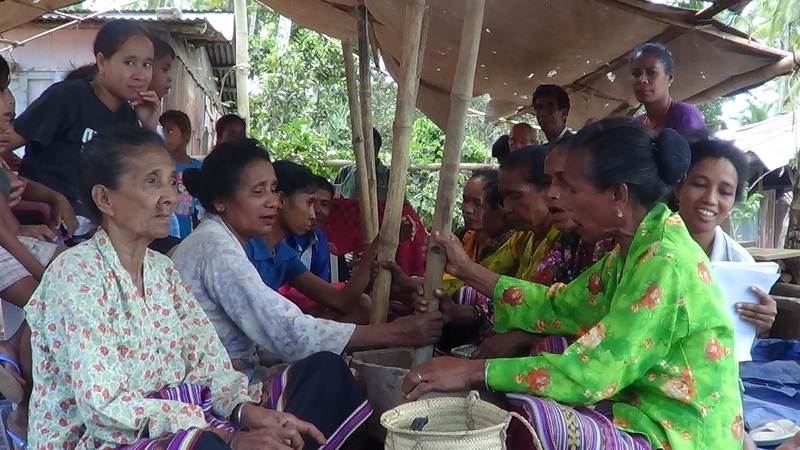Dublin Core
Title
Vaihoho Orontafa (rice husking sung poem) - Aldeia Codu
Subject
Rice husking song sung by community members in aldeia (hamlet) Codu.
Description
ENGLISH
Much of Fataluku oral literature is held and told through the vast body of sung poetry known as vaihoho. Vaihoho engage metaphor to tell historical events. Vaihoho were once predominantly themed around the melancholia of love, but are now more about recent tragedies of conflict, war and loss. Others themes pertain to harvest.
Vaihoho are traditional poems either spoken or sung, often in call-and-response format performed a capella by choirs of varying sizes. Vaihoho two-part singing is performed for welcoming guests, weddings, harvests, funerals and heavy work (threshing rice, hauling a tree from the forest, planting the post of a house, harvesting sea worms, walking, passing the time). Symbolism and imagery is engaged in the telling of vaihoho, which range in length from one to many stanzas. Vaihoho poems may be told in the ordinary daily language, but often use a high literature language with rare or archaic words. To be able to sing vaihoho requires understanding its complicated and intricate rules and archaic words. For this reason opportunities to learn vaihoho are diminished today, and few people born after 1980 are able to sing vaihoho.
A range of vaihoho were documented in this study, including a bride price song, lipal vaihoho nu, used in negotiating a wedding contract; rice husking songs (orontafa) used when preparing rice for ceremonies; songs about love, iha-rala vaihoho, and songs about the hardships of the period of resistance to the Indonesian occupation, halu vaihoho, which uses a metaphor of a large tree that falls on the land; and vaihoho iharala, songs about the orphans left after war. Funeral singing, sa’u, is used at the funerals of elders, and has its own rituals involving making offerings of gifts of animals and textiles. As sa'u rituals are sacred, these were not able to be documented by researchers, despite their frequent occurrence in the Lautem region.
Much of Fataluku oral literature is held and told through the vast body of sung poetry known as vaihoho. Vaihoho engage metaphor to tell historical events. Vaihoho were once predominantly themed around the melancholia of love, but are now more about recent tragedies of conflict, war and loss. Others themes pertain to harvest.
Vaihoho are traditional poems either spoken or sung, often in call-and-response format performed a capella by choirs of varying sizes. Vaihoho two-part singing is performed for welcoming guests, weddings, harvests, funerals and heavy work (threshing rice, hauling a tree from the forest, planting the post of a house, harvesting sea worms, walking, passing the time). Symbolism and imagery is engaged in the telling of vaihoho, which range in length from one to many stanzas. Vaihoho poems may be told in the ordinary daily language, but often use a high literature language with rare or archaic words. To be able to sing vaihoho requires understanding its complicated and intricate rules and archaic words. For this reason opportunities to learn vaihoho are diminished today, and few people born after 1980 are able to sing vaihoho.
A range of vaihoho were documented in this study, including a bride price song, lipal vaihoho nu, used in negotiating a wedding contract; rice husking songs (orontafa) used when preparing rice for ceremonies; songs about love, iha-rala vaihoho, and songs about the hardships of the period of resistance to the Indonesian occupation, halu vaihoho, which uses a metaphor of a large tree that falls on the land; and vaihoho iharala, songs about the orphans left after war. Funeral singing, sa’u, is used at the funerals of elders, and has its own rituals involving making offerings of gifts of animals and textiles. As sa'u rituals are sacred, these were not able to be documented by researchers, despite their frequent occurrence in the Lautem region.
Creator
Many Hands International
Source
Preservation of Endangered Forms of Intangible Fataluku Cultural Expression Project
Date
27 - November - 2012
Rights
Video, photo and text rights: Many Hands International
Language
Fataluku
Coverage
Aldeia Codu , Suku maina II , Postu Administrativu Lautem/Moro
